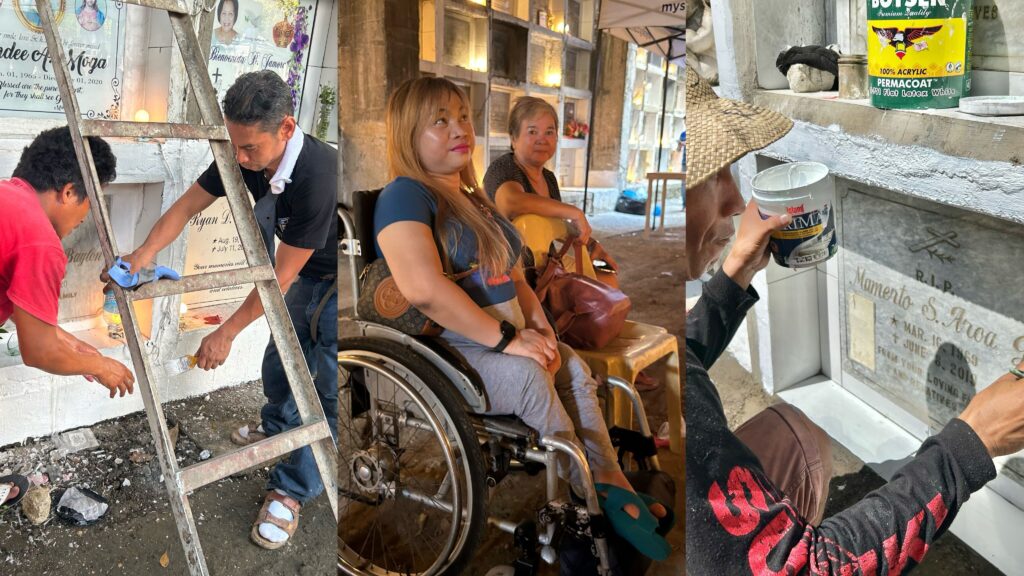
Pricelyn Cañete and Jose Basan, gravestone painters (left), Nikka Bejasa (center), and Michael Solon (right) are among the individuals in the Carreta Cemetery in Cebu City, on Wednesday, November 1.
CEBU CITY, Philippines – Undas, or Kalag-Kalag, is the time for people to visit the resting places of their departed loved ones.
This is usually the period when people reflect and connect with the departed, who hold a special place in their hearts.
It has become a tradition to bring fresh flowers, light candles, and share stories of cherished memories.
However, despite the long-executed Undas traditions that have come to define Undas, there are those who, instead of partaking in the usual Undas rituals, choose to devote these days to earning a living.
READ MORE: LIVE UPDATES: Kalag-Kalag or Undas 2023
Pricelyn Cañete, 41, and Jose Basan, 38 are one of these hardworking individuals who spent the first day of Kalag-Kalag providing service to people by repainting gravestones for a fee at the Carreta Cemetery in Cebu City.
Originally from Carmen town, northern Cebu, Cañete, and Basan chose to forgo visiting their families during the season in order to earn a living,
“Kinanhanglan man mangita ug trabaho. Adto, wala mi’y pangita,” Cañete told CDN Digital on Wednesday, November 1. (We need to find work. There, we can’t earn.)
The fees for their services vary, ranging from P100 to P250, depending on the size of the gravestones.
“Kini among pangita kay para sa among pamilya raman sad. Basin ugma, maka uli mi, depende,” Cañete added. (This is for our family anyway. Maybe tomorrow we can go home. It depends.)
READ MORE: Lapida making: Engraving gravestones, a maker’s remarkable journey
Moreover, another hardworking individual spent his time as well in cleaning and repainting some gravestones on Wednesday, November 1.
Michael Solon, 36, a resident of Barangay Carreta in Cebu City, is actually working as a construction worker during the ordinary days.
But he decided to have this ‘sideline’ in this year’s Kalag-Kalag, where he could earn from P100 to P300 per request.
“Kung kalag-kalag, daghan man gud [og customers],” he said. (During this time, there are a lot of customers.)
Solon usually starts working at 9 a.m. and ends at 6 p.m.
Solon found this season a good opportunity for him to earn an income, besides visiting his departed loved ones in the cemetery.
Meanwhile, Nikka Bejasa, 45, considers Undas season as the time to commemorate the memories she shared with her father.
“Mangayo ko og guidance sad niya. Close man gud kaayo mi. Sukad nidako, siya na ang mi protect nako,” Bejasa said.
Bejasa, who has faced the challenges of living with polio, has been in a wheelchair for her entire life, and it was her father’s guidance that strengthened her amidst obstacles.
“Wala ko naka feel ana na part [difficulty of having a polio] kay gitudloan jud ko niya nga dapat strong ko, dapat wise ko. Na dili ko madlok sa mga tawo,” she expressed.
Bejasa finds comfort in visiting her departed father during this time, as she often sees him in her dreams, making it a special and meaningful tradition for her.
Kalag-kalag might hold different meanings to each of us, but what matters is how we honor the memories of our loved ones and celebrate the traditions that connect us to our roots, creating a unique tapestry of remembrance and respect.
/bmjo